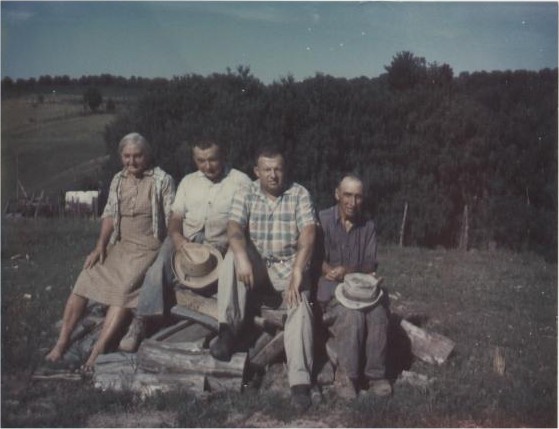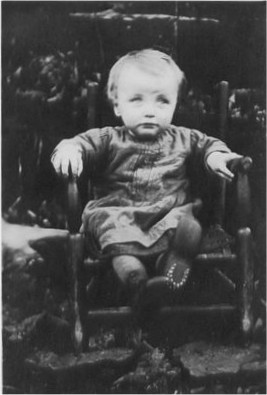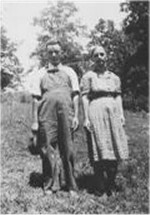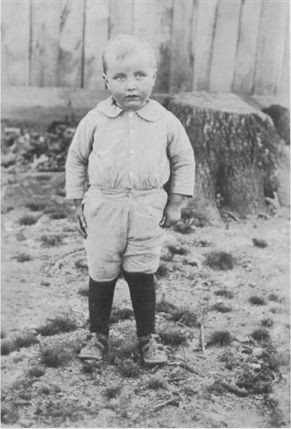|
The Jumping Off Place |
|
| Since I grew up in the town of Livingston, I had some adjustments and quite a few changes to get used to when I married and moved to Taylors Crossroads. I had the attitude that many folks I saw in passing who lived in that community were not very friendly to me, but now, as I look back, I can see that it wasnít necessarily that way at all. I was the one who was probably not as friendly as I could have been. When I moved there in the early 60's, I still had a lot of growing up to do myself. Not too long after I married, I can remember quite clearly going with my husband to the home of Gordon Ferrell, his sister, Maude (Ferrell) Holt, and her son, Ward Holt. In the eyes of a nineteen year old girl who grew up in town, their property seemed like a very remote and lonely place, and that it was just at the end of the earth. In fact, I often referred their property as "The Jumpiní Off Place." I would like to add here that my attitude has changed very much over the years, and for the better I like to think. | |
|
Stanley Carter often visited in the Ferrell/Holt home. Sitting atop their wood pile from left to right: Maude Holt, Ward Holt, Stanley Carter and Gordon Ferrell. (Photo courtesy of Stanley Carter) |
|
|
With the help of my husband and Stanley Carter, I have put together a little information on Gordon Ferrell, his sister, Maude, and her son, Ward. They were known to be serious minded people who didnít care too much for what they considered foolishness. Gordon Ferrell and Maude Ferrell were the children of Alvin Ferrell and Army (Taylor) Ferrell. Maude married John Albert Holt, a brother of Andy Holt, someone I did a story on earlier, that folks referred to as "The Picture Man." Maude and John Albert Holt had one son, Ward. John Albert died at the very young age of 26. His young son, Ward, was just three years old at the time of his fatherís death. The Ferrell home, located some two miles in a southwestwardly direction from Taylors Crossroads, was a two-room cabin with a loft. The home was heated with a stone fireplace and a wood cooking stove. There were two beds in the front room. Even though electricity was very much available in that area during the later years that this family made their living off the land, it was something they never had. There was a spring nearby that provided water for their home. |
|
|
Note the brads in the baby shoes Gordon Ferrell has on. (Photo courtesy of Stanley Carter)
|
|
| Gordon
Ferrell was considered to be a smart man, even though he could not read or
write. Maude knew how to read and write, and her son, Ward, attended
school at Ozone and at Lone Maple. Gordon built his own blacksmith shop
from scratch that had all the necessary tools for black smithing. Handmade
sleds used in farm work made from natural curved sourwood trees were also
crafted by his skilled hands. He was always on the lookout for this type
of wood as well as other kinds of wood that could be used for farm
implements which he also made by hand.
Gordon, Maude, and Ward grew vegetables, had a tobacco crop, and raised hogs and cattle. Stanley described them as loving the land as well as their livestock, and cared for both better than most folks did for children. They owned a sow for a great number of years that was said to have had at least a thousand pigs in her life. Even though she lived long past the time she was considered useful, she was given their special care and attention until the day she died. Her remains are in a nearby field where she was properly buried after her demise. Gordon learned quickly how the farm land could benefit from nutrients during the time when President Roosevelt was in office. A program was begun under Rooseveltís term whereby farmers were given phosphate and lime to help enrich the soil and better crops were the result of adding these to what had become just worn out dirt. After receiving these items that were provided to farmers free of charge from the government, from that point on, Gordon made sure his crops always were the best they could be, and was careful to include fertilizer and other nutrients when needed. Popcorn was another crop they grew, and Maude would often take it to a good customer in town who bought it to use in their business, that being the Ritz Theater. To make a popcorn delivery, she would sometimes catch a ride on one of the shirt factory buses that also ran into Livingston on Saturdays for those who needed to do shopping and transact other business on a weekend. Many in the neighborhood around Taylors Crossroads bought onion sets from Gordon at the beginning of gardening time. The onions were kept in a sack and hung on the wall of the front room. They were called multiplying onions. Beans that had been strung together for drying purposes were also hung in one corner of the room.
|
|
|
Photo of Maude Holt and son Ward Holt taken near their home. (Photo courtsey of Stanley Carter)
|
Maude often
visited with Stanleyís wife, Geneva Carter, and would sometimes bring
along homemade sausage to give her that had been placed in a corn shuck as
a way to preserve it. Selling hogs and a calf from time to time, along with raising a tobacco crop provided an income for the family. Keeping money in a bank was not something they ever considered until Gordon got sick and needed to be hospitalized. A story was told that on this occasion, Ward went to one of the out buildings near their home and brought back a large sack filled with money. They were somehow persuaded to put this large amount of money in the bank, and a total of more than $40,000.00 was counted out of the sack. Iíll just bet persuading them to become bank customers was not an easy task.
|
|
A baby picture of Ward Holt.
|
|
|
Although Gordon and Maude lived in a time when man walked
on the moon, they lived out their lives with very little the modern world
had to offer. They did at some point buy a car, but no one ever learned
how to drive it. It was told that Ward did try to learn, but many times he
would have to get J.B. Smith to come on his tractor and pull the car out
of a ditch. Stanley described them as good and gentle people, and it is
obvious that he had a great deal of respect for each one. After both
Gordon and Maude had passed away, Ward bought a mobile home that was
placed on the property, and he later married. Living in a mobile home must
have seemed very strange to him after growing up in the little log house
with an oil lamp for light and a fireplace for heat. Iím sure that took
some getting used to. Changes and adjustments are something weíve all had
to do at one time or another, sometimes for the better, sometimes not.
Itís part of life and of growing older. If I could go back to that day I
visited the Ferrell place that summer day many years ago, and if I could
see with the eyes I have now, Iím sure I would see it as a peaceful but
primitive setting, and one that was certainly no where near the ends of
the earth.
|
|



